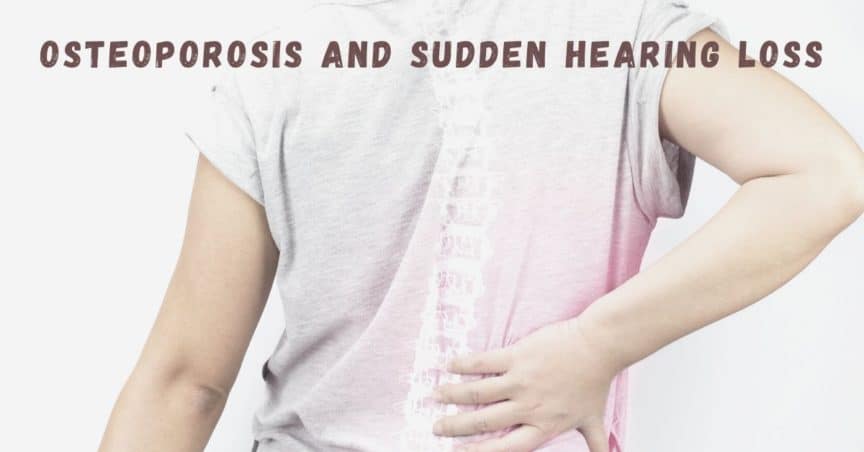Osteoporosis is a health condition that causes bones to weaken, making them increasingly vulnerable for breakage. Nearly 44 million people have osteoporosis or low bone mass, making this a prevalent disease. Like other medical conditions including cardiovascular disease, diabetes, dementia, and hypertension; osteoporosis has been linked to hearing loss. Research has long shown that osteoporosis can contribute to the development of sudden hearing loss.
What is Osteoporosis?
Our bones develop and strengthen until young adulthood which is when bones reach peak mass (when bones are the strongest). As we age, bone cells are constantly dissolving and forming; a process referred to as remodeling. When the rate of bone cells dissolving is quicker than bone cells forming, bones become weak and brittle; increasing the likelihood of fracture or breakage. This condition is known as osteoporosis which is the reduction of bone mass and strength.
Osteoporosis can be caused by a variety of risk factors including:
- Unchangeable factors: age, race, sex, and genetic history. People who are likelier to experience osteoporosis are older adults, women, white and Asian descent, and people with any family history,
- Medical conditions: such as kidney, liver, celiac disease; lupus, and cancer increase the risk of osteoporosis
- Other: low calcium intake, little physical activity
People are often unaware that they suffer from osteoporosis until they have fractured or broken a bone. In early stages of osteoporosis, there are no noticeable symptoms. Once the condition has progressed, other signs include: stooped posture, shortened height, and back pain.
How Hearing Works
To understand the relationship between osteoporosis and hearing loss, it is important to know how exactly we hear. The sense of hearing relies on the health of our ears and brain, it involves:
- Outer ear: consists of the cartilage and skin that is the most visible part of the ear in addition to the ear canal and ear drum. The eardrum separates the outer ear from the middle ear.
- Middle ear: composed of three connected bones, referred to as the ossicles, and the eustachian tube (responsible for equalizing pressure in the ear).
- Inner ear: consists of the cochlea, filled with thousands of hair cells and fluid, as well as the auditory nerve.
The outer ear picks up sound from the environment which travels through the ear canal and strikes the eardrum. This causes the ossicles to vibrate which moves the soundwaves further into the ear, activating the cochlea. The movement of hair cells and fluid in the cochlea help convert the soundwaves into electrical signals that are then sent to the brain through the auditory nerve. The brain is then able to process and make meaning of the sound.
Osteoporosis and Hearing Loss
Studies have shown a correlation between osteoporosis and sudden hearing loss. Sudden hearing loss is hearing loss that occurs rapidly, occurring in an instant or over a few days. Quick loss of hearing is caused by damage in the inner ear, to the cochlea and/or nerve pathways leading to the brain.
To explore this relationship, researchers at the Chi Mei Medical Center in Taiwan conducted a study published in the Journal of Clinical Endocrinology and Metabolism in 2015. In this study, researchers analyzed data from the National Health Insurance program database which includes nearly all of Taiwan’s residents. They compared the data between 10,660 patients with newly diagnosed osteoporosis from 1998-2008 with 31,980 people without osteoporosis. Capturing data from the participants until 2011, the findings included:
- People with osteoporosis were 76% more likely to develop sudden hearing loss
- Women with osteoporosis were 87% more likely to develop sudden hearing loss
These statistics reveal the significant correlation between osteoporosis and sudden hearing loss. Researchers suggest that in addition to the deterioration of the ossicles bones in the middle ear, cardiovascular systems could be impacted by osteoporosis which can contribute to the development of sudden hearing loss.
Treating Hearing Loss
It is important to have your hearing assessed, especially if you have noticed any changes in your hearing abilities. Hearing exams determine any impairment, type, and degree of hearing loss which informs effective treatment. Hearing loss is most commonly treated with hearing aids which can significantly increase one’s ability to hear, improving overall quality of life!

